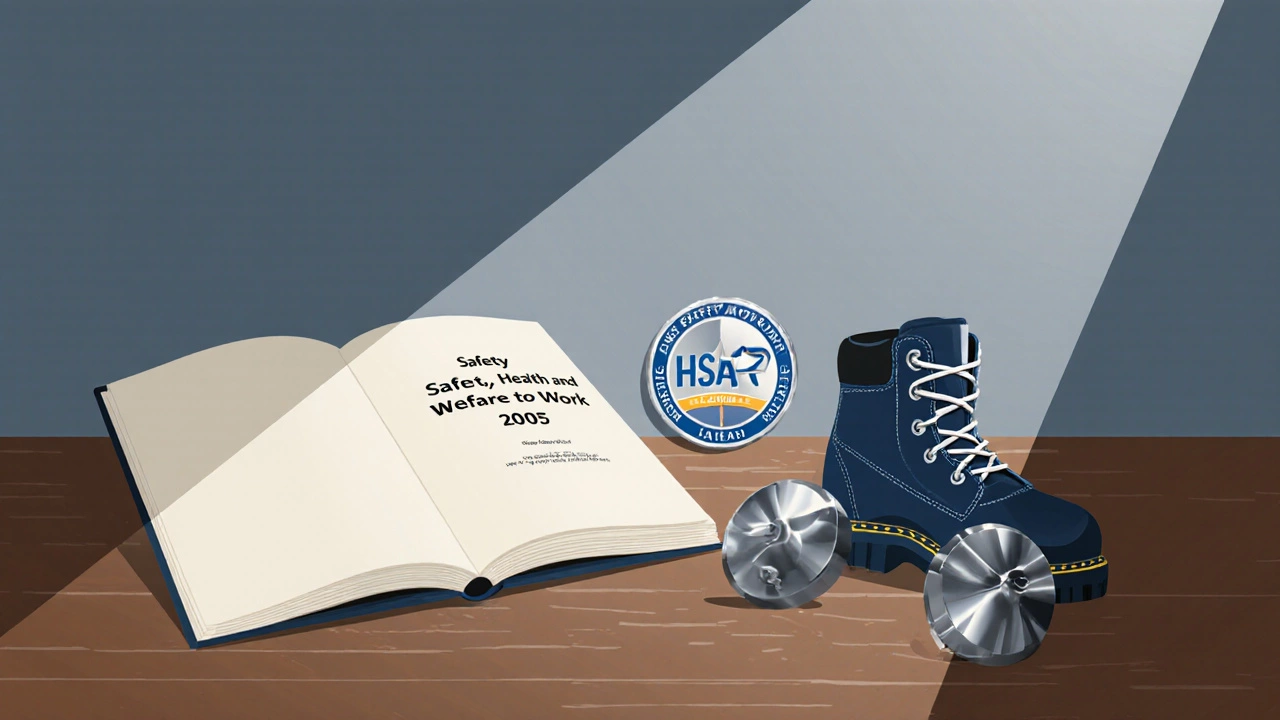Irish Work Shoe Reimbursement Calculator
Find out if your employer is legally required to pay for your work shoes and what reimbursement you might be entitled to under Irish law.
Quick Takeaways
- Irish law does not automatically require employers to provide or pay for work shoes, but health‑and‑safety rules can create an obligation.
- If your job involves a specific safety risk, the employer must supply suitable footwear that meets HSA standards.
- Many Irish companies include shoe allowances in collective agreements or uniform policies - it’s worth checking your contract.
- When the law is silent, you can negotiate a reimbursement by presenting a clear cost‑benefit case.
- Keep receipts, document the risk, and reference the Employment (Miscellaneous Provisions) Act 2018 when you raise the issue.
Walking into a Dublin office or a Cork warehouse, you’ll notice different footwear requirements. While a fintech employee may sport sleek leather brogues, a construction crew on the outskirts of Galway needs steel‑capped boots. The question that pops up for many Irish workers is simple: Should my employer foot the bill for these shoes? This article untangles the legal framework, the most common industry practices, and the steps you can take to get the right shoes without draining your own wallet.
Work shoes are footwear that meets the specific safety or uniform requirements of a job, ranging from safety boots to polished leather dress shoes. In Ireland, the definition often ties back to the Health and Safety Authority’s guidance on occupational footwear. Understanding how the law, unions, and everyday business culture intersect will help you decide whether you’re entitled to a free pair, a stipend, or a tax‑free reimbursement.
Legal Landscape in Ireland
The first stop is the Health and Safety Authority (Health and Safety Authority (HSA)). Under the Safety, Health and Welfare at Work Act 2005, employers must provide a safe working environment, which includes appropriate footwear when there is a risk of injury.
Key legal references:
- Safety, Health and Welfare at Work Act 2005 - mandates that personal protective equipment (PPE), including safety boots, be supplied when needed.
- Employment (Miscellaneous Provisions) Act 2018 - clarifies that any benefit, including a shoe allowance, may be a taxable benefit unless it qualifies as a necessary work expense.
- Revenue Commissioners guidance on benefits in kind - outlines when shoe purchases are tax‑free.
In practice, if your role involves hazardous conditions (e.g., construction, manufacturing, food processing), the employer is legally required to provide footwear that meets HSA standards. For office‑based or retail roles where the risk is minimal, the law does not force the employer to foot the bill, but many choose to do so as part of a uniform policy.

Typical Employer Policies Across Irish Sectors
Below is a snapshot of how various Irish industries handle work shoe costs. The figures are based on surveys from the Irish Business and Employers Confederation (IBEC) and anecdotal data from Dublin’s tech hubs and Cork’s industrial parks.
| Industry | Policy Type | Cost to Employer (€ per year) | Employee Benefit | Typical Documentation |
|---|---|---|---|---|
| Construction | Free steel‑capped boots supplied | 150‑250 | Compliance, no out‑of‑pocket expense | HSA compliance form |
| Food processing (e.g., Kerry Group) | Reimbursement up to €120 | 90‑120 (claimed) | Tax‑free if approved | Receipt + risk assessment |
| Retail (e.g., Brown Thomas) | Uniform allowance includes shoes | 80‑150 | Standardised look, tax‑free | Uniform policy document |
| Tech/Finance (e.g., Dublin fintech firms) | Optional shoe stipend €50‑100 | 50‑100 | Flexibility, partially taxable | HR request form |
| Public sector (e.g., Dublin City Council) | Provided by department | 120‑180 | Uniform compliance | Government procurement list |
Notice the range: safety‑critical roles get free shoes, while office jobs might only get a modest stipend. Knowing where your sector sits helps you set realistic expectations when you ask HR.
How to Make a Strong Case for Reimbursement
Even if the law doesn’t compel your boss, a well‑structured request can tip the scales. Follow these steps:
- Identify the risk. Point to a specific hazard - slippery floors in a kitchen, heavy objects in a warehouse, or the need for a professional look in client‑facing roles.
- Gather evidence. Use the HSA’s personal protective equipment guidelines (you can print them out) and any internal risk‑assessment reports.
- Check your contract or collective agreement. Many unionised workplaces have clauses that mention "uniform and protective footwear".
- Prepare a cost‑benefit brief. Show the price of a compliant pair (e.g., a pair of steel‑capped boots from Irish Safety Boots costs around €140) and compare it to the potential cost of an injury claim.
- Submit a formal request. Use your HR portal or, if none exists, send an email titled “Request for Work Shoe Provision - Health & Safety Compliance”. Attach receipts, risk docs, and the brief.
When you reference the Revenue Commissioners guidelines, you signal that you’ve done your homework on tax implications, which HR often appreciates.
Checklist: What to Keep Handy
- Copy of your employment contract or union agreement.
- HSA safety footwear standards (available on the HSA website).
- Price quotes from at least two Irish retailers (e.g., Shoezies in Dublin, Clarks Ireland in Limerick).
- Receipt and proof of purchase for any shoes you’ve already bought.
- Notes on any injuries or near‑miss incidents that relate to footwear.
Having these documents ready speeds up the approval process and reduces back‑and‑forth emails.

Real‑World Irish Examples
To illustrate how the rules play out, here are three short stories from different corners of the country.
1. Dublin’s tech start‑up culture. A software company in the Silicon Docks offered a €75 monthly shoe allowance after a junior developer complained about foot pain from standing during product demos. The HR team framed it as a "well‑being perk" and processed it as a non‑taxable benefit because the shoes were identified as "required for client‑face" duties.
2. Cork’s food‑processing plant. An employee at a large malt‑production facility requested steel‑capped boots after slipping on a wet floor. The employer, referencing the Safety, Health and Welfare at Work Act, supplied the boots free of charge and documented the provision in the plant’s safety register.
3. Galway’s boutique retail store. A sales assistant wanted matching black leather shoes to meet the store’s dress code. Management agreed to cover 50% of the cost, treating it as part of the uniform allowance. The employee received a receipt and the expense was recorded as a taxable benefit, but the net cost to the staff member was modest.
These anecdotes show a spectrum: from fully free safety boots to partial uniform subsidies. Your outcome will depend on the job’s risk profile and the company’s culture.
Mini FAQ - Quick Answers to Common Queries
Frequently Asked Questions
Does Irish law require all employers to provide safety shoes?
Only when a genuine health‑and‑safety risk exists. If the job involves hazards like heavy objects, chemicals, or wet surfaces, the Safety, Health and Welfare at Work Act 2005 makes footwear a must‑have PPE.
Can I claim a tax deduction for work shoes I bought myself?
Yes, if the shoes are a required work expense and you can prove they’re not suitable for everyday wear. The Revenue Commissioners allow a tax‑free reimbursement up to a reasonable amount (usually €150‑€200) when the employer approves the purchase.
What if my contract says “uniform provided” but doesn’t mention shoes?
Uniform clauses often imply footwear, especially if a specific style is required. Ask HR for clarification; a written response can be used later if you need to claim the expense.
Are there any Irish unions that help with shoe allowances?
Yes, bodies like the Irish Congress of Trade Unions (ICTU) often negotiate uniform and PPE provisions in collective agreements. Check if your workplace is covered by an ICTU‑affiliated union.
What should I do if my employer refuses my request?
First, ask for a written explanation. If the refusal contradicts safety regulations, you can raise the issue with the Health and Safety Authority or seek advice from a trade union. In extreme cases, a formal grievance may be lodged.
Next Steps for Employees
Armed with the legal backdrop, industry benchmarks, and a clear request template, you’re ready to approach HR. Remember:
- Document the safety risk - a photo of a wet floor or a slip incident goes a long way.
- Quote reputable Irish retailers - it shows you’ve done market research.
- Reference the relevant Acts - it signals you understand the obligations.
- Be prepared for a discussion - some employers offer a modest stipend instead of free shoes.
If the conversation stalls, consider contacting the HSA for guidance or your trade union for support. In most Irish workplaces, a reasonable request for proper footwear is seen as a win‑win: you stay safe, and the employer avoids potential injury claims.
Whether you’re in a Dublin office, a Limerick warehouse, or a rural farm, the right pair of shoes can keep you comfortable and compliant. Don’t let the cost be a barrier - use the steps above and make sure your feet are covered, literally and legally.
